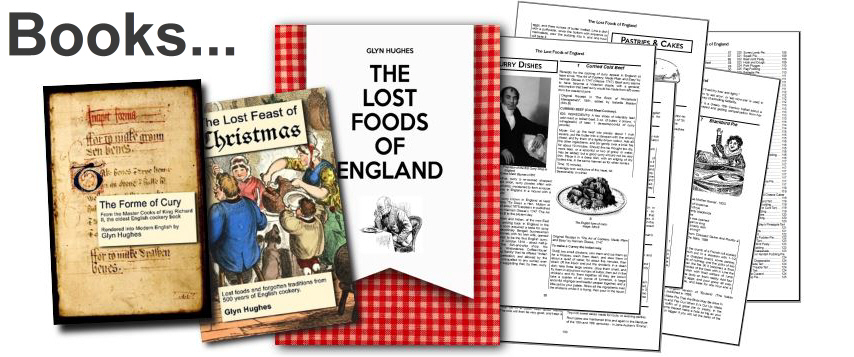

|
 Grains, usually hulled cracked wheat (as ‘Bulgur’ wheat), or occasionally barley, boiled in milk (for a sweet desert dish) or stock (for a savoury accompaniment to meat) with seasonings. Sometimes elaborately flavoured with saffron, spices etc. and sometimes thickened with egg. Known at least since Cury 1390 A soft frumenty made with pearl barley Image: Alex Bray…  Original Receipt in ‘The Forme of Cury‘ by the Chief Master-Cook of King Richard II, c1390 (Cury 1390) Original Receipt in ‘The Forme of Cury‘ by the Chief Master-Cook of King Richard II, c1390 (Cury 1390)FOR TO MAKE FURMENTY Take clean wheat and crush it in a morter well that the hulls go all by them selves. Take fair fresh broth and milk of almonds or sweet milk of cows and temper it all. and take the yolks of eggs. Boil it a little and set it down and present it forth with fat venison and fresh mutton. ‘Furmity’ served with fruit and a slug of rum, plays a major role in Thomas Hardy’s ‘The Mayor of Casterbridge‘. “A dish once prominent at Christmas was ‘frumenty’ or ‘furmety’ (variously spelt, and derived from the Latin frumentum, corn). It was made of hulled wheat boiled in milk and seasoned with cinnamon, sugar, &c.; … In Yorkshire it was the first thing eaten on Christmas morning, just as ale posset was the last thing drunk on Christmas Eve.” – ‘Christmas in Ritual and Tradition, Christian and Pagan‘ by Clement A. Miles, 1912 Honey sweet, Curds to eat, Cream and frumenty, Shells and beads, Poppy seeds, You shall have plenty – ‘Sleepyhead’ by Walter de la Mare, c1902 A biographer of Thomas ‘Stonewall’ Jackson says that the US general; “fancied that he had some mysterious internal malady, and would eat nothing but frumenty, a preparation of wheat.” The 1582 Douay-Rheims translation of the Bible, in I Samuel: 17:17 has “And Isai said to David, his son: Take for thy brethren an ephi of frumenty, and these ten loaves, and run to the camp to thy brethren”, the later 1601 ‘King James’ version has “parched corn”.  Original Receipt in ‘The Accomplisht Cook‘ by Robert May, 1660 (Robert May 1660); Original Receipt in ‘The Accomplisht Cook‘ by Robert May, 1660 (Robert May 1660);To make Furmety. Take wheat and wet it, then beat it in a sack with a wash beetle, being finely hulled and cleansed from the dust and hulls, boil it over night, and let it soak on a soft fire all night; then next morning take as much as will serve the turn, put it in a pipkin, pan, or skillet, and put it a boiling in cream or milk, with mace, salt, whole cinamon, and saffron, or yolks of eggs, boil it thick and serve it in a clean scowred dish, scrape on sugar, and trim the dish. The compendium Telescope (1822, p. 298), says of village life in Yorkshire at year-end; “The yule candle is lighted, and a supper is served, of which one dish, from the lordly mansion to the humblest shed, is invariably furmety. Yule cake, one of which is always made for each individual in the family, and other more substantial viands are also added. Furmety also has a small association with Mothering Sunday – see note at Mother’s Day Cake See: Cree’d Wheat Frumenty – Lincolnshire Version Frumenty – Suffolk Version Meat Rice Porpoise  |
|
MORE FROM Foods of England... Cookbooks ● Diary ● Index ● Magic Menu ● Random ● Really English? ● Timeline ● Donate ● Royalty ● English Service ● Food Map of England ● Lost Foods ● Accompaniments ● Biscuits ● Breads ● Cakes and Scones ● Cheeses ● Classic Meals ● Curry Dishes ● Dairy ● Drinks ● Egg Dishes ● Fish ● Fruit ● Fruits & Vegetables ● Game & Offal ● Meat & Meat Dishes ● Pastries and Pies ● Pot Meals ● Poultry ● Preserves & Jams ● Puddings & Sweets ● Sauces and Spicery ● Sausages ● Scones ● Soups ● Sweets and Toffee ● About ... ● Bookshop ● Email: [email protected] COPYRIGHT and ALL RIGHTS RESERVED: © Glyn Hughes 2022 BUILT WITH WHIMBERRY |